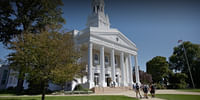The Department of Modern and Classical Languages seeks to provide undergraduate students communicative competence in a second language, greater understanding of and appreciation for other cultures, insight into the human experience of other peoples, intellectual development through enhanced cognitive and analytical skills, and the integration of these experiences with liberal arts into a world view which encompasses the historic Christian faith.
In the college curriculum, ?Classics? primarily refers to the cultures of the ancient Mediterranean, with special focus on Greece and Rome. Classicists are interested in how the peoples of these cultures and civilizations have inspired traditions that have shaped the world from the medieval cultures of Christian Europe and the Islamic Middle East to today?s America.
The Greeks give us Homer?s Iliad and Odyssey, political ideas of freedom and democracy, the beautiful poetry of the tragic hero, intellectual foundations of science and philosophy, and some of the most striking art and architecture the world has ever seen. The Romans give us the political development of republican thinking and practice, technological developments, terrific comedies, stoic philosophy and an extraordinary empire within which Christianity had its origins.
Classics is a multidisciplinary enterprise. Language study is necessary to help us think like a Roman or a Greek, but work in Classics involves attention to many fields ? history, philosophy, religion, art and theatre among them. Since the classical Mediterranean world included lands on three continents (Africa, Asia, Europe), Classics is very much a multicultural endeavor.








